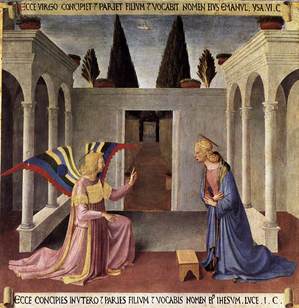
What happened here in Nazareth, far from the gaze of the world, was a singular act of God, a powerful intervention in history, through which a child was conceived who was to bring salvation to the whole world. The wonder of the Incarnation continues to challenge us to open up our understanding to the limitless possibilities of God's transforming power, of his love for us, his desire to be united with us. Here the eternally begotten Son of God became man, and so made it possible for us, his brothers and sisters, to share in his divine sonship. That downward movement of self-emptying love made possible the upward movement of exaltation in which we too are raised to share in the life of God himself (cf. Phil 2:6-11).
The Spirit who "came upon Mary" (cf. Lk 1:35) is the same Spirit who hovered over the waters at the dawn of Creation (cf. Gen 1:2). We are reminded that the Incarnation was a new creative act. When our Lord Jesus Christ was conceived in Mary's virginal womb through the power of the Holy Spirit, God united himself with our created humanity, entering into a permanent new relationship with us and ushering in a new Creation. The narrative of the Annunciation illustrates God's extraordinary courtesy (cf. Mother Julian of Norwich, Revelations 77-79). He does not impose himself, he does not simply pre-determine the part that Mary will play in his plan for our salvation: he first seeks her consent. In the original Creation there was clearly no question of God seeking the consent of his creatures, but in this new Creation he does so. Mary stands in the place of all humanity. She speaks for us all when she responds to the angel's invitation. Saint Bernard describes how the whole court of heaven was waiting with eager anticipation for her word of consent that consummated the nuptial union between God and humanity. The attention of all the choirs of angels was riveted on this spot, where a dialogue took place that would launch a new and definitive chapter in world history. Mary said, "Let it be done to me according to your word." And the Word of God became flesh.
When we reflect on this joyful mystery, it gives us hope, the sure hope that God will continue to reach into our history, to act with creative power so as to achieve goals which by human reckoning seem impossible. It challenges us to open ourselves to the transforming action of the Creator Spirit who makes us new, makes us one with him, and fills us with his life. It invites us, with exquisite courtesy, to consent to his dwelling within us, to welcome the Word of God into our hearts, enabling us to respond to him in love and to reach out in love towards one another.
Pope Benedict XVI14 May 2009
Basilica of the Annunciation, Israel
As a way of deepening the Mystery of the Incarnation, here is "Beyond the Clash of Absolutes: Abortion" taken from Carl A. Anderson's 2010 book, Beyond A House Divided.


Leave a comment